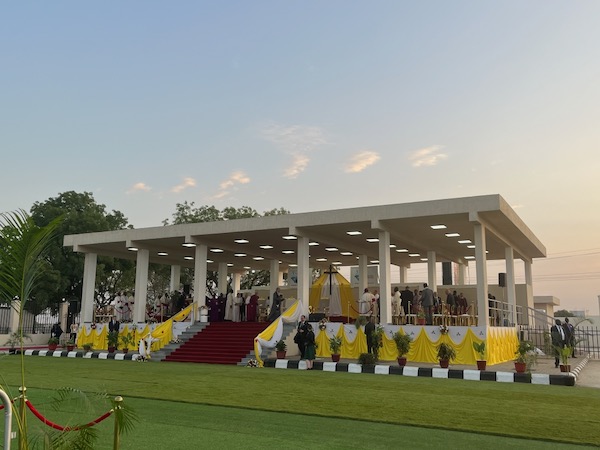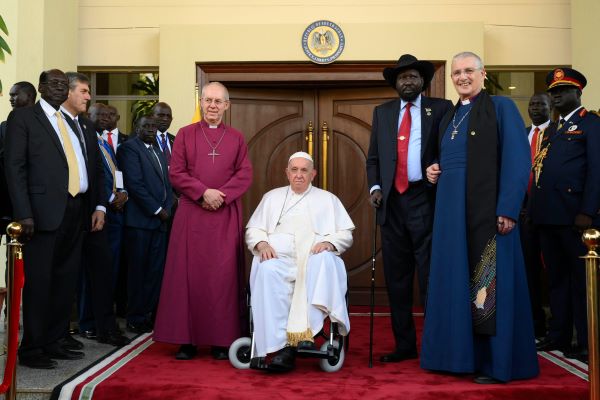Pope Francis says that the death of Benedict XVI was used by unethical people in the Church who wanted to “score points” by setting Francis against his predecessor.
Speaking during an in-flight papal press conference on the way back from his ecumenical pilgrimage to South Sudan, the 86-year-old Pope said the claim that Benedict was “upset about this or that” in retirement are “fairy tales”.
Francis said that the death of the Pope Emeritus, which led to a flurry of books and articles attacking his papacy, was “instrumentalised.”
Although he did not mention names, Francis’ remarks can be read as a direct response to the book written by Archbishop Georg Gänswein, Benedict XVI’s secretary.
In the book, Gänswein revealed that Benedict had written privately to Francis critiquing an interview he’d given while the German prelate complained bitterly about losing his position as Prefect of the Papal Household.
“I would like to say that I could speak about everything with Benedict and exchange opinions. He was always at my side, supporting, and if there was some difficulty, he told me, and we spoke. There were no problems,” the Pope insisted on the plane from Juba to Rome.
“I think Benedict’s death was instrumentalised. People wanted to score points for their own side. And the people who instrumentalise such a good person, so close to God I would almost say…they are people who belong to a party, not to the Church.”
Francis said there’s a “tendency” to take sides with theologically partisan positions.
“Let’s drop it, these things will fade way,” the Pope said. “Some stories that they’ve told, that Benedict was upset about this or that thing that I did, are fairy tales [‘storie cinesi'].”
As his custom on every foreign trip, Francis came to the back of the plane to take questions from journalists. But on this occasion, he was joined by the Archbishop of Canterbury, Justin Welby, and the Moderator of the Church of Scotland’s General Assembly, Iain Greenshields.
It was the first time a papal press conference was attended by leaders of other Churches, which was conducted in Italian and English with simultaneous translation from Holy See spokesman Matteo Bruni.
Francis's remarks came in answer to a question as to whether the death of Benedict had created a rift in the Church.
The Pope admitted that some in the Church saw in Benedict a figure whom they could complain to about Francis. While the Pope Emeritus lived in the Vatican, a court emerged around him which was deeply opposed to this pontificate.
Archbishop Gänswein tightly controlled access, and figures strongly supportive of Francis struggled to meet the Pope Emeritus. In The Outsider: Pope Francis and his Battle to Reform the Church, I report that the German Cardinal Walter Kasper, a long-time friend of Benedict and a theologian of the same vintage, was not able to get an audience.
The Pope said that an unnamed theologian had “denounced” him to Benedict due to his support of same-sex civil unions, and that the Pope Emeritus then consulted four “top level” cardinals and asked them for an explanation.
“They explained it, and so the story ended,” the Pope said. “He [Benedict] wasn’t frightened.”
Francis was also asked what he would say to the priests and bishops of Africa in response to reports that some gay people are kicked out of their homes or told to undergo exorcisms to clean them of evil spirits.
The Pope reiterated his call for the decriminalisation of homosexuality and that gay people “are children of God, and God loves them, he accompanies them,” and that to condemn a gay person is sinful.
“It’s true that some in this state, for different situations, are not wanted, but to condemn a person like that is a sin,” Francis explained.
“To criminalise people with homosexual tendencies is an injustice. I am not talking about groups, but people. You can say ‘they make groups, etc’, but they are people. Lobbies are another thing, but they are people.”
Archbishop Welby said he entirely agreed “with every word” Francis had said and would “quote the Holy Father” during General Synod, which begins this week and will be debating how far the Church can liturgically recognise same-sex unions.
The archbishop said he had a “deep sense of encouragement” following his peace pilgrimage to South Sudan with the Pope.
“There was a sense of heart speaking to heart,” Welby told reporters.
“There is a momentum at middle level and at the grassroots and what we now need is a serious change of heart from the leadership. They have to agree to a process that will lead to a peaceful transition of power.
“They’ve been told this publicly, we’ve said it to them: there has to be an end to corruption and gun smuggling and the amassing of huge quantities of weapon. That will require further work.”
He said that a door had been opened, and now was the time to “crash open the door” and to make serious progress ahead of planned elections in South Sudan in 2024.
Francis said that outside “economic interests” are exploiting land and minerals across Africa, a theme that Archbishop Welby took up when talking about the Democratic Republic of Congo, which the Pope visited before South Sudan.
“We need to be clear: Congo is not the playground of the great powers or for the piracy of the small mining companies. The companies there act irresponsibly with artisanal mining, kidnap, the use of child soldiers, rape on a huge scale, and they simply pillage the country.
“That country should be one of the richest countries on the face of the planet, [and] one of the biggest granters of aid to the rest of Africa. It has been tortured.”
The Pope also discussed forthcoming trips and said a visit to India is planned for next year.
He will also go to Marseille on 29 September and Lisbon in August for World Youth Day. In Europe, the Pope says he wants to go to the “smallest countries” pointing out his early trip to Albania.
Archbishop Welby said he would be happy to make future trips with the Pope if it could help Francis.
Dr Greenshields said he would be unlikely to join a future trip as his term of office expires in May. But he said that a future moderator joining a papal trip could be female as the next moderator is a woman. That sparked applause from some of the 75 journalists travelling with the Pope to Africa.



 Loading ...
Loading ...